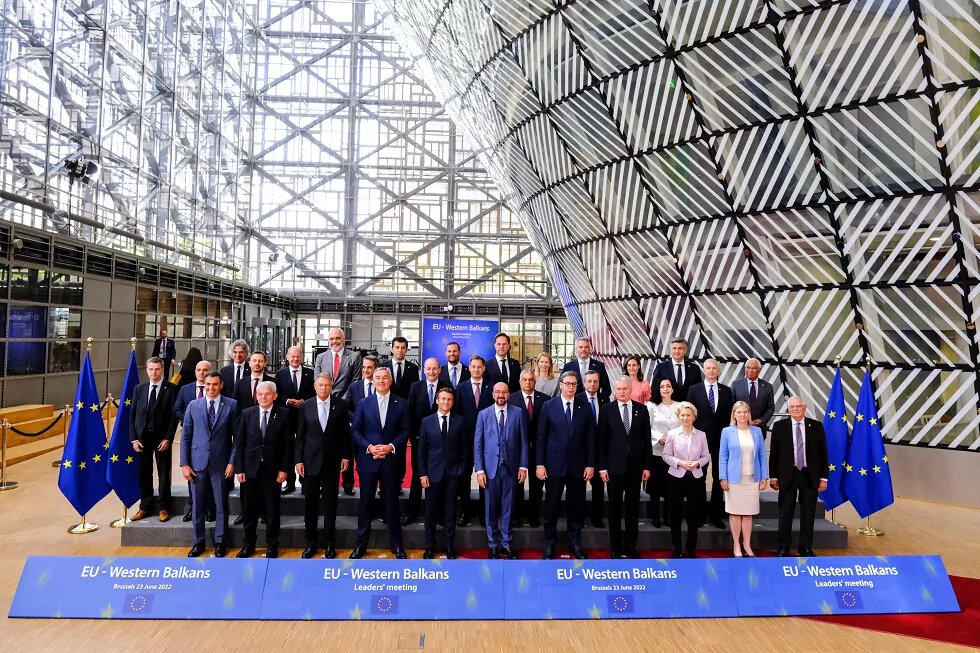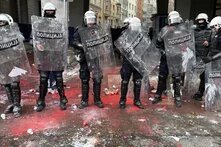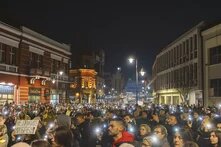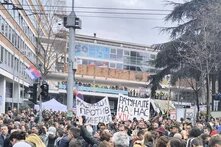The EU–Western Balkans Leaders' Meeting concluded more as a win for Putin and his allies than for progressive forces in the Western Balkans. The European Council did not meet the challenge of the moment, writes Simon Ilse.

“A new day in Europe but not in Bulgaria!”, were the words of the impulsive, but utterly sincere, Albanian Prime Minister Edi Rama entering the EU-Western Balkans Leaders' Meeting on the morning of 23 June 2022. The long-awaited date, on which France wanted to conclude its EU Council presidency by re-energizing a dormant enlargement process against the background of Putin’s war of aggression in Ukraine, ended in disaster for the former Yugoslav states of the Western Balkans and Albania.
The expectations, at the very least, would have been the opening of accession negotiations with North Macedonia and Albania, visa liberalization for Kosovo and a positive signal for Montenegro’s new government. They failed; Europe failed. The joy regarding the granting of candidacy status to Ukraine and Moldova goes hand in hand with the disappointment for the six Western Balkan states that were given the same promise almost 20 years ago. Essentially, the EU celebrated itself for granting a status that it simultaneously emptied of credibility. Albania's Edi Rama rightfully felt “sad about the EU” during the press conference following the summit.
Resuming the tragedy, paragraph 18 of the European Council conclusions deplored that the “last remaining issues between North Macedonia and Bulgaria” could not be resolved. Without any doubt, this statement falls short of the geopolitical challenges the EU currently faces. This summit could have been the moment for the EU to demonstrate geopolitical smartness, define its reaction to the invasion of Ukraine and show the world in a resolute way that it is worth striving for its model: European liberal democracy and quality of life. It would have meant not just advancing enlargement but seriously starting to think about what an enlarged 35-country union would look like, and how it would be effective in upholding its values and achieving its goals.
Instead, the EU allowed the ethno-nationalist demands and interests of the corrupt former Bulgarian Prime Minister Borisov to block the path towards the future of Europe. Without wanting to repeat the Bulgarian demands here, they are illegitimate and racist in essence and demand the self-denial of another European nation. A French proposal tried to forge a compromise in the last days of the closing EU presidency, but being non-transparent, analysts and commentators called the proposal a “foul trick”, while politicians have applauded it as a breakthrough. The truth is that even acceptable points, like mentioning the Bulgarian minority in the North Macedonian constitution, would need a change of constitution, and hence a broad backing from the parliament in Skopje, including the nationalist VMRO-DPMNE group. Even if an intergovernmental conference to open accession negotiations with North Macedonia and Albania was called tomorrow, below are some of the structural problems that remain unaddressed.
The European Council conclusions radiate the false impression that this is just about another inter-state dispute between two Balkan countries. It is not; it is a very political, ideological dispute, similar to the kind of clash between democratic internationalists and autocratic nationalists that we experience with Russia. The latter are very much alive in the Balkans and have powerful representatives, all of them with links to Moscow.
In North Macedonia, nationalists associated with the opposition party VMRO-DPMNE cannot wait to annul the historic Prespa agreement with Greece and take the country off the path to EU membership. In Montenegro, the pro-Serbian unionists of the Democratic Front are removed from the levers of power for the moment but will not hesitate to drum up divisions for electoral gain, with the help of the Serbian Orthodox church. In Bosnia and Herzegovina, Co-presidents Milorad Dodik and Dragan Čović still pursue the ethno-nationalists divisive agenda of the 1990s. Asked for an opening statement on the morning of the EU summit, Serbian president Vučić said, with regards to further EU integration: “If it happens good, if not no problem, we’re still grateful for the European investments and we’ll take care of ourselves”. Which translates very directly to pursuing the Serbian nationalist agenda, meaning, in Vučić’s case, the realisation of the “Serbian world”, which is the goal of unification with the Republic of Srpska (in Bosnia and Herzegovina), Montenegro and Northern Kosovo. This project is justified by the thesis of discrimination against Serbs in neighbouring countries, which is identical to the Russian narrative about the endangerment of Russians in Ukraine or elsewhere. By making positive steps forward, last week’s summit was supposed to weaken all of these destabilizing tendencies, yet it did the contrary.
It is time for Europe to wake up to the reality that the clash described above has reached the EU institutions themselves and has been, for some time now, an enemy from within. A case in point is Viktor Orbán’s man in Brussels – the Hungarian Commissioner for Neighbourhood and Enlargement, Olivér Várhelyi. In a tweet 45 minutes before the European Council’s exchange with the Western Balkans started, he affirmed that “the EU takes all the Bulgarian concerns very seriously and they are now part of the negotiation”, positioning the EU on the side of Bulgaria’s hardliners, who had helped to bring down Kiril Petkov’s progressive anti-corruption government the day before.
We now have a twofold problem with EU enlargement. First, that the Bulgarian blackmailing of a neighbour from a position of power could become a model in what has become the bazar of national interests in the European Council. There are endless other bilateral problems and historical disagreements between European nations that can paralyse the enlargement process once and for all. Second, last week’s events are a blow to all pro-European forces in the Western Balkans, who defend a rules-based order in their countries against the law of the jungle and a merit-based European integration process against chauvinist deal making in the name of stability and investments alone.
On Friday 24 June 2022, the European Council continued discussions around Macron’s idea of a European political community, which he laid out, for the first time, during his speech concluding the conference on the Future of Europe. The conclusions remain rather vague as to what expect from the idea. Reassurances about it not replacing enlargement are supposed to calm suspicion that Macron’s political community is just another move to keep the Western Balkans away from membership while binding them economically to the EU. Currently, it seems obvious that Germany, claiming not to want anything else but enlarged membership, needs to come forward with a few fresh proposals. What is Berlin’s vision?
Europe advances when it forges consensus around the bigger picture: its political identity and future organisation, internally and externally. The morning of the EU–Western Balkans Leaders' Meeting, knowing what was about to come, Albania's Edi Rama called it a “scary show of impotence”. He was right.


